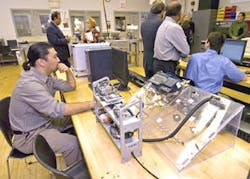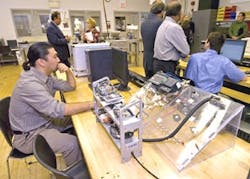Schools Get Tools From Automation Vendors
As the field of industrial automation changes, educators need to maintain pace.
Two universities, Northern Illinois University and California State University, Chico recently benefited from donations made by automation vendors to their classroom labs.
Lab and the Professor
“Thanks to the generosity of AutomationDirect, our students have access to the latest technology, and their skills are on the cutting edge when they graduate,” says Cliff Mirman, chair of the NIU Department of Technology. “We hear from employers all of the time that our graduates have an advantage when applying for jobs based upon their familiarity with this equipment.”
LAB TECHNOLOGY
Northern Illinois University senior Aritomo Ito, a technology major, tries out some of the equipment in the new lab.
Source: NIU
“AutomationDirect has been a generous supporter of the college for many years, and we are delighted to formalize that relationship through the naming of this laboratory and professorship,” says Promod Vohra, dean of the college. The new professor, Andrew Otieno, is charged with supervising and creating professional development training in the lab, which currently supports a PLC course and an automation course, in which students learn to integrate components such as sensors, switches and output devices with PLCs. As a final project, student teams design automation systems which sort parts, using the integration of vision, PLCs, sensors and pneumatics.
Power Panels With a Purpose
In 2007 Nick Repanich, adjunct research professor at the Department of Mechanical Engineering, Mechatronic Engineering & Manufacturing Technology at CSU, Chico, was looking for a unique concept of one programming environment that would control many devices with the ability to choose a programming language that would suit various class levels, including ladder logic. “Before we had all this industrial hardware from B&R, like controllers, pneumatics and steppers, we had a design project that used straws, mousetraps, doweling, hot glue and paperclips, to solve some problems,” he says.
Each semester the students at CSU, Chico, have to build different machines with automated solutions. In each project, they use power panels and other components donated by B&R Industrial Automation as the main control system. Additional peripheral devices can be connected via the standard integrated CAN interface. The mechanical engineering students control pneumatic actuators, read sensors, control stepper motors and, in one particular project, read the analog voltage of a battery to determine its condition. “We now are able to teach critical technologies that all engineers should know,” explains Repanich. “At the end of their bachelor’s degree studies, our students are sought after as ready to work and contribute due to the large number of student projects and the type of hands-on education they get there.”


